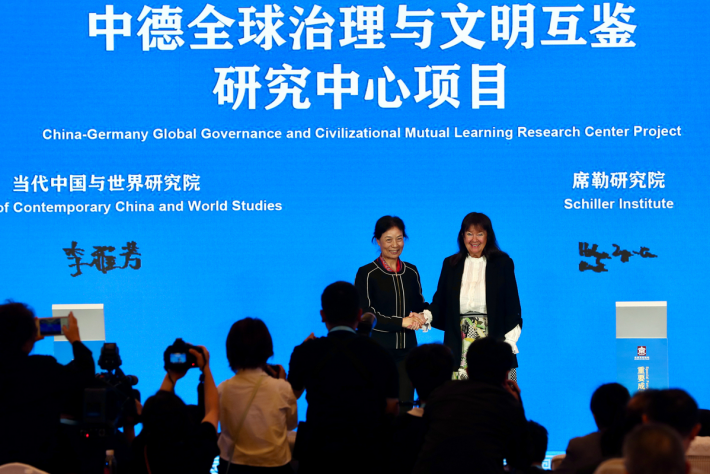On September 23rd and 24th, a conference took place in Beijing, with the theme “Exchanges and Mutual Learning: Respecting the Diversity of Civilizations,” organized by the China International Communications Group and the Academy of Contemporary China and World Studies. It gathered hundreds of delegates and high-ranking officials from China and all over the world, including Schiller Institute founder Helga Zepp-LaRouche, for a rich discussion about history, culture, and mutual learning.
Yu Yingfu, the vice president of the China International Communications Group (CICG), cited in his keynote speech historical examples of peaceful exchanges of ideas between civilizations, naming, for example, Zhang Qian’s expedition (138-126 BCE) to the West, reaching Xinjiang and later Bactria (northern Afghanistan), with which he laid the basis for the formation of the Silk Road trade routes, which were not only a route for trade, but also became an exchange route for science and culture. He also cited Zhang He’s seven voyages to the Western Oceans all the way to East Africa, as well as the spread of Buddhism from India into China. Yu Yingfu also emphasized today’s need for exchanges and mutual learning toward a shared vision in order to move humanity forward.
Helga Zepp-LaRouche, who founded the Schiller Institute, participated in a roundtable discussion as part of the forum with the theme, “Promoting World Peace and Development Through Exchanges and Mutual Learning Among Civilizations.” In her remarks she called for a concerted effort to rescue the West from its self-induced isolation from the Global Majority, and for the West to join into a dialogue of civilizations for a new paradigm of development.
The former Vice Minister of Foreign Affairs of China Le Yucheng called for the use of digital technology and AI to make cultural knowledge more accessible to the population. During the conference proceedings, several such projects were presented, including one by the National Library of China, which makes 143,000 volumes of ancient Chinese books available to the public with the aid of digitalization and the utilization of AI. China’s Federation of Literary and Arts presented their effort to collect all ancient myths, songs, ballads, epics, and legends, which will be, when completed, the largest such database of folk literature in the world. Also highlighted was China’s aim to build a digital library for technology and science in order to promote scientific knowledge and make China into a technological powerhouse.
At the forum there was also a presentation of the cooperation of the Shanghai Museum with Egypt’s Supreme Council of Antiquities (SCA), where they organized the largest-ever overseas exhibition of ancient Egyptian artifacts in the last decades, with the title “On Top of the Pyramid: Civilization of the Ancient Egypt,” with altogether 2.77 million visitors in Shanghai and another 30 billion impressions online. The interest for the exhibit was so big, that the Shanghai Museum extended their hours in the final days of the exhibit to 24 hours a day. The Shanghai Museum is now partnering with Egyptian archaeologists for joint excavation projects.
This emphasis on the promotion of the classics was also echoed by David Gosset, the founder of the China-Europe-America Global Initiative, who emphasized the importance of the works of Plato, Confucius, and Dante in order to create a culture with depth. He emphasized: “Wisdom is not born of code. It is cultivated through reflection, through engagement with history, with ethics, with literature and art—through the humanities.” He emphasized that the ultimate purpose of AI technology must be for the betterment of mankind as a whole.
If one contrasts this level of discussion with the prevalent liberal value ideology of the West, where there are no more rational standards for the good, the beautiful, and the true, and if one sees the enormous effort China and other Global South nations put into the promotion of their greatest philosophical and cultural traditions, it becomes clear which part of the world is in decline and which is on the rise.
It is time for the West to leave behind its superficial ideas about the cultures of the nations of the Global South—ideas that, in many respects, are relics of the colonial and neocolonial era, which is now approaching its historic end.
The promotion of the creative aspects of the human soul must once again be the sole aim of education. In the realm of creativity, there will be no place for national chauvinism; the discoveries of one genius will be an everlasting enrichment for all humankind.
The nations of the West have become societies without historical and philosophical grounding, disconnected from their own better historical legacy. All citizens of good will should do their utmost to leave this behind and to ensure that at the next Beijing Cultural Forum, there is meaningful representation from governments and institutions of the Global North to join this global civilizational initiative.
Tobias Faku











